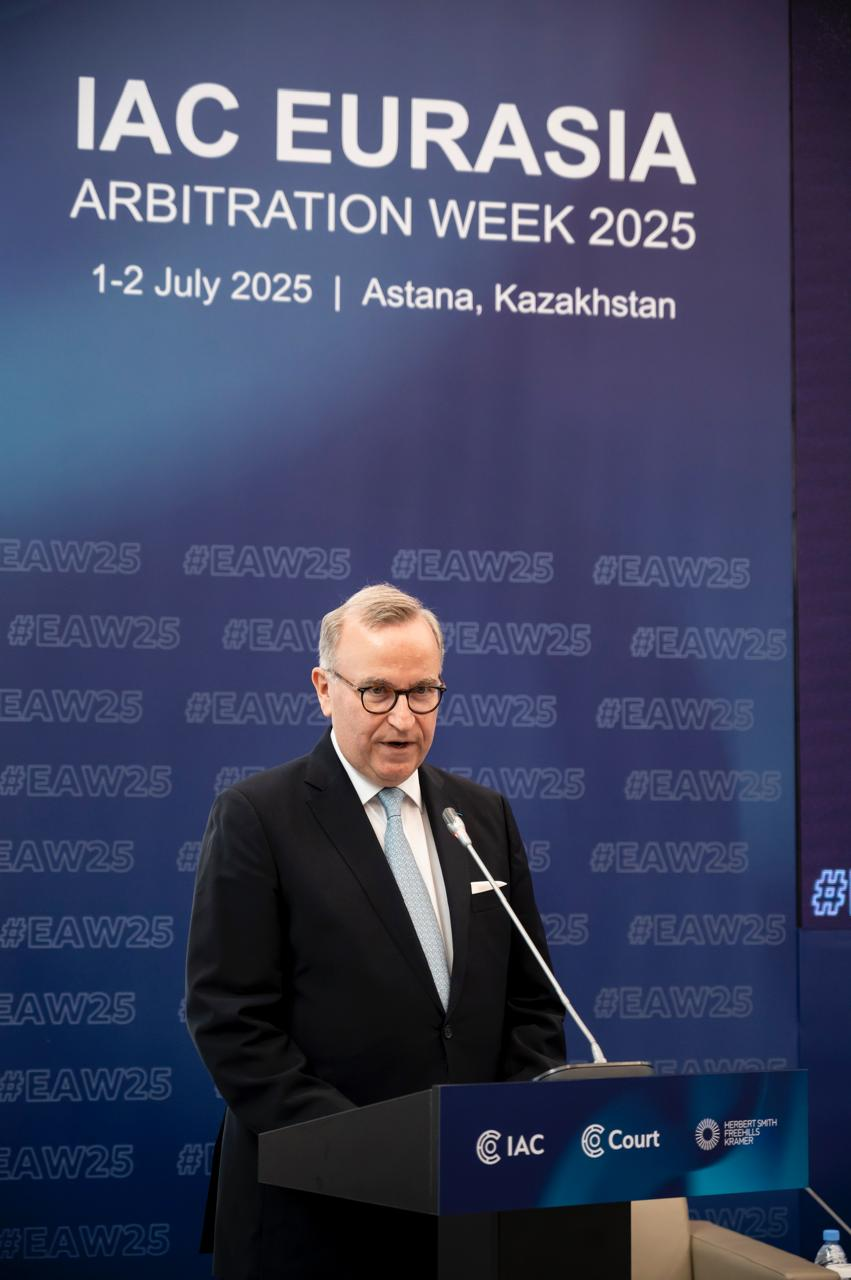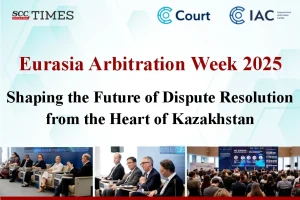Introduction
On 1 July 2025, the IAC Eurasia Arbitration Week 2025 (EAW25) officially opened in Astana, Kazakhstan. The event brought together the international arbitration community to discuss key developments and trends in dispute resolution. Now in its third year, EAW25 gathered around 400 participants, including leading practitioners, arbitrators, judges, academics, and representatives of business, government and diplomatic institutions from Kazakhstan, the United States, the United Kingdom, Middle East, Europe and Asia. The forum reaffirmed Astana’s position as the regional legal hub.
EAW25 was organised by the International Arbitration Centre (IAC) at the Astana International Financial Centre (AIFC) in cooperation with the international law firm Herbert Smith Freehills Kramer LLP.
About the Event
Eurasia Arbitration Week (EAW) is a platform for leading arbitrators, private practice lawyers, in-house counsel, policymakers and academics to discuss modern arbitration and dispute resolution practices, opportunities, challenges, and solutions for business in Eurasia
The International Arbitration Centre (IAC) is an independent legal entity. It has its own procedural rules modelled on best international practice. It has its own panel of leading international arbitrators and mediators having many years of arbitration and mediation experience in commercial law, including oil and gas, trade, construction, energy, financial services, banking, Islamic finance, insurance, and intellectual property. IAC arbitration awards are recognised and enforceable in Kazakhstan and internationally.
The AIFC Court is an independent legal entity. It has its own procedural rules modelled on English common law procedures and leading international practice. The AIFC Court is separate and independent from the courts of the Republic of Kazakhstan. It consists of two tiers: a Court of First Instance, which includes a specialist division known as the Small Claims Court; and a Court of Appeal. It has exclusive jurisdiction over disputes arising out of the activities and operations of the AIFC and jurisdiction in the case of other disputes in which all parties agree in writing to give the AIFC Court jurisdiction. It does not have jurisdiction in relation to disputes that are of a criminal or administrative nature. It applies the most up to date and efficient case management practices.
The Astana International Financial Centre (AIFC) is a leading financial hub in the Eastern Europe and Central Asia region, designed to connect global capital with the vast opportunities of emerging markets. Positioned at the crossroads of Europe and Asia, the AIFC combines international best practices with innovative approaches to create a world-class platform for investment, business, and financial services. Since its establishment in 2018, the AIFC has attracted over USD 14.8 bln in investments into Kazakhstan’s economy. Over 4,000 companies from 80+ countries, including the USA, the UK, China, Turkiye, the Republic of Korea, Singapore, and others, are registered within the AIFC’s jurisdiction.
Highlights of Eurasia Arbitration Week 2025
The event was attended by The Lord Burnett of Maldon, Chief Justice of the AIFC Court, Mr. Thomas Krümmel, Chairman of the IAC, as well as leading practitioners, arbitrators, judges, and representatives of the business community, diplomatic corps, government institutions, and academia from Kazakhstan, the United States, the United Kingdom, Europe and Asia.

The programme included a wide range of sessions focused on the evolving role of arbitration and ADR in supporting investment, good governance, and legal certainty. Key themes included the strategic role of arbitration in attracting foreign investment, the application of technology and artificial intelligence in arbitral processes, and the development of effective dispute resolution systems in emerging markets.
Panel Highlights: Exploring Trends, Challenges, and Solutions in Arbitration
Navigating Arbitration Across Eurasian Borders
The first panel session of the main programme at Eurasia Arbitration Week 2025, “Navigating Arbitration Across Eurasian Borders”, brought together regional experts to examine the role of arbitration at the intersection of diverse legal traditions, institutional frameworks, and cultural expectations.
Moderated by Mr. Thomas Krümmel, the IAC Chairman, the discussion underscored arbitration’s dual function as a neutral venue often applying English law as a trusted mechanism for dispute resolution in Eurasia. Krümmel emphasised that “arbitration is not just a set of legal rules, it is a complex social phenomenon shaped by the cultural, historical, and institutional context”. Panelists noted that arbitration operates within a complex landscape influenced by geopolitics and varying legal cultures, requiring both legal precision and cultural flexibility. Mr. Nick Gvinadze (Gvinadze & Partners LLC, Georgia) remarked, “legal reform is not just about legislation, it is about trust. Without trust, there is no arbitration”, while Dr. Lara Panosch (Herbert Smith Freehills Kramer LLP, Germany) highlighted that “effective arbitration is not only about compliance with the law, but also about respecting parties’ perspectives and cultures”. The session further highlighted Kazakhstan’s rapid transformation to a jurisdiction with over 50 codified legal areas, enhancing its appeal as a seat for international arbitration. Attention was also given to digitalization trends, including the EU’s “digital lawyer passport” initiative which documents language skills, cultural competencies, and professional experience, tools essential in today’s global arbitration environment. Overall, the panel reaffirmed the AIFC Court and its IAC as key drivers of legal modernisation and regional standard setting in Eurasian arbitration.
Professor Maria Chiara Malaguti on the Future of Trade Law, Arbitration, and Gender Inclusion
A major highlight of EAW25 was the session with Professor Maria Chiara Malaguti, President of UNIDROIT, who shared valuable insights on the future of international trade law, arbitration, and gender diversity in the legal profession. She highlighted how investment law is evolving from the traditional investor—host state model to address new challenges such as sustainability and climate change, including the development of verified carbon credit markets.
Reflecting on this shift, Professor Malaguti stated, “Investment law was born in a world of clear investor-host state divides. Today, every state is both an investor and host. We must rethink legal frameworks to reflect this new reality where investment, trade, and sustainability are inseparable”. In arbitration, she noted a move towards contract-based disputes balancing investor protections with public interests like human rights and called for reforms addressing parallel proceedings involving arbitral tribunals and national courts.
She also observed, “We are moving towards more specialised, localised arbitration centres solving not just mega deals, but everyday disputes. This decentralisation is key to preserving the rule of law in a fractured world”.
On gender equality, Professor Malaguti acknowledged progress but emphasised persistent cultural barriers for younger female arbitrators, urging institutions to take a more proactive role in promoting diversity. Despite concerns over global governance challenges, she expressed optimism about the growing number and specialization of arbitration centres worldwide, which expand access to dispute resolution beyond traditional hubs and help protect public interests across borders.
FDIs in Eurasia: Impact of ADR on Investment Climate
The panel “FDIs in Eurasia: Impact of ADR on Investment Climate”, moderated by Professor Maria Chiara Malaguti (UNIDROIT), brought to light how legal infrastructure underpins regional investment strategy. With contributions from Joe Tirado, Ardak Idayatova, Shirin Gurdova and others, the discussion emphasised that in jurisdictions where judicial independence remains uneven, arbitration has become a de facto prerequisite for FDI. Increasingly complex cross-border investments, involving sectors such as digital infrastructure, energy, and water-intensive data centres, have exposed gaps in domestic systems unable to resolve disputes with sovereign dimensions. Speakers noted a growing reliance on treaty-based and contract-based arbitration mechanisms, while also pointing to underused tools like mediation and conciliation under ICSID rules. Professor Malaguti underscored the strategic dimension: “Trust is the currency of investment — ADR is the architecture that holds that trust”.
Cross-Border Enforcement of Arbitral Awards in Eurasia: Practical Insights
At a session titled “Cross-Border Enforcement of Arbitral Awards in Eurasia: Practical Insights”, organized by the AIFC Court and International Arbitration Centre (IAC), leading regional and international experts examined the evolving challenges of enforcement across jurisdictions. Moderated by Christopher Campbell-Holt OBE, Registrar and Chief Executive of the AIFC Court and IAC, the panel featured distinguished speakers including Lord Burnett of Maldon (UK), Chief Justice of the AIFC Court, alongside senior lawyers from Kazakhstan, France, and Russia. Lord Burnett highlighted the Court’s full institutional independence and its growing caseload with 188 cases resolved to date as critical to its credibility. Panelists emphasised the important role of the New York Convention in facilitating cross-border recognition and enforcement of arbitral awards, while also addressing practical differences in local enforcement environments. With Kazakhstan reporting a 93% enforcement success rate and institutions like the IAC demonstrating procedural efficiency and impartiality, the discussion underscored that robust enforcement mechanisms serve not only as procedural tools but as fundamental indicators of legal certainty and trust in the rule of law throughout the Eurasian region.
Adapting Arbitration Practices to the AI Age
The final panel session turned the spotlight toward the future of arbitration in the age of artificial intelligence. Experts discussed how AI is already being explored as a tool for legal analysis, document review, and dispute prediction. While speakers acknowledged the challenges surrounding transparency, bias, and data protection, they emphasised that AI’s integration into arbitration is not a distant prospect but an emerging reality. As the session concluded, it was noted that practitioners should approach AI not with apprehension, but as a strategic instrument, so long as regulatory frameworks and ethical safeguards evolve in parallel.
Essential tips for effective arbitration advocacy: How to win a case?In addition to the sessions outlined above, panel discussions also addressed practical strategies and commercial perspectives on arbitration. The session “Essential Tips for Effective Arbitration Advocacy: How to Win a Case?” explored key techniques for presenting persuasive arguments and navigating procedural complexities, with guidance from experienced advocates and arbitrators. Another session, “Corporate Counsel Perspectives: Choosing ADR over Litigation”, featured in-house legal experts discussing the strategic benefits of alternative dispute resolution for businesses, including efficiency, confidentiality, and enforceability. These panels added further depth to the programme, offering valuable insights for both legal practitioners and corporate counsel.
Statistics of the AIFC Court and the IAC
Since commencing operations on 1-01-2018, the AIFC Court and the IAC have successfully completed and enforced more than 3,900 cases, including 188 court judgments, and 3,772 arbitration awards and mediation settlements. The disputes covered a wide range of commercial dispute matters, reflecting the evolving needs of the business community.
Investors with business in Kazakhstan from 32 countries, including most Eurasian countries and other key Kazakhstan trading partners such as China, UAE, and India, used the AIFC Court to decide business disputes. 789 lawyers from 39 jurisdictions registered with the AIFC Court for rights of audience to represent Parties in cases at the AIFC Court.
The AIFC Court and IAC have world class physical premises in Astana, and in Almaty, Kazakhstan. AIFC Court hearing rooms were launched in 8 countries within Eurasia: Armenia, Azerbaijan, Georgia, Kyrgyzstan, Tajikistan, Turkey, Turkmenistan, and Uzbekistan. Recently, the AIFC Court and IAC also provided access to a world-class office facility in Beijing, China.
Concluding Reflections
Eurasia Arbitration Week 2025 not only highlighted the dynamic evolution of international arbitration across Eurasia but also positioned Astana as a forward-looking legal hub embracing innovation, inclusivity, and global cooperation. With its focus on practical solutions, emerging technologies, and the rule of law, EAW25 reinforced the critical role of arbitration in fostering trust, investment, and sustainable development in an increasingly complex global landscape. As the region continues to modernize its legal infrastructure, the conversations and connections forged at EAW25 will undoubtedly shape the future of dispute resolution in Eurasia and beyond.

